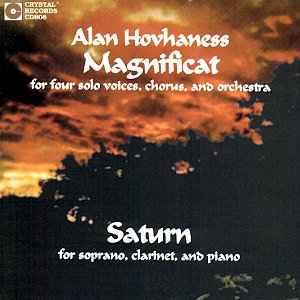
Hovhaness's spiritual teacher was the painter Hermon diGiovanno. DiGiovanno
lead him to explore the cultures of Armenia, Greece, Egypt and India. This
coincided with his decision to incinerate his many works in 1943 and to establish
an amateur string orchestra in New York to play his and others' music. This
included the oriental aleatory or Spirit Murmur. Its slipping and
sliding violins were widely imitated in the early 1960s.
This disc presents one major (though comparatively short) choral/orchestral
work and one chamber work. Both have the voice as their still calm centre.
The Magnificat was premiered at Wichita Falls, Texas on 26 January
1959. Its inaugural celestial fanfare is one of Hovhaness's kindest themes
intoned delicately by trombone, trumpet and horn. Beauty too kindles all
of the choral singing which may well have inspired Rutter. Hovhaness may
have taken inspiration from Howells, Fauré, Hadley and Finzi though
the final result is different from each. The baritone is rather under-powered
but the other singers rise reasonably (and better) to the challenge. The
recording quality on the Misericordia track (7) causes a transient
blast of distortion on the sustained high notes of the soprano but nothing
serious. This work is not strongly oriental and as the notes suggest convey
some of what we may take as the blessed spirit of the early Christian church.
All is gentle until the rustling hornet flight of the strings at Esurientes
Implevit Bonis (9) and strangeness descends again in the cackling whispers
of Sicut Locutus est (11). The final Gloria Patri runs forward
with a Christmassy trumpet solo of sweet repose after which the choir follow
in similarly exalted style.
Saturn is in 12 miniature movements. It is a study (or I take it to
be) in the loneliness of space and its far remote dark worlds. Saturn
Celestial Globe (16) introduces some humanity (or is it intended as a
reference to human life or some Apollonian alien culture?) in a dance for
clarinet entwining around the soprano voice while the piano keeps up a constant
filigree. This moods continues into O Lost Note. I can imagine this
music also being sung by Hinako Fujihara. The sounds of perpetual cataracts
are evoked in Giant Globe and On Wings of a Soundless Note.
As in all of this series the full texts are given together with positively
helpful notes giving full background on the composer and the works.
The Magnificat was licensed from Louisville so I wonder if there is any chance
they can pick up a licence for symphony No. 15 Silver Pilgrimage on
Louisville LP LS662 and couple it with the Poseidon recording of the
Ani symphony. I understand that this is unlikely as there has been
talk about the Louyisville series re-systematically emerging on CD reissues.
As with many (all?) of these discs the original tapes are analogue. There
is supposed to be some hiss. The technicians at Crystal sagaciously resisted
the temptation to remove it knowing full well that this usually robs the
bloom of the original. Hiss is best filtered by the mind of the listener
rather than the subtle hand of the audio techie.
Another strong disc in the series.
Reviewer
Rob Barnett

Price 16.95 US dollars plus 2 US dollars per shipping within USA.
Orders from outside the USA please contact Crystal direct for quote.
step off from Neptune
Credit card orders (Visa or MC) are accepted.
Crystal Records
28818 NE Hancock Rd
Camas, WA 98607
phone 360-834-7022, fax 360-834-9680
email: order@crystalrecords.com
web: www.crystalrecords.com
